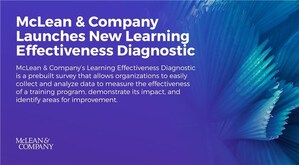Global HR research and advisory firm McLean & Company's new resource explains that functional competencies provide the greatest possible return when developed to address specific functional and organizational needs.
TORONTO, Feb. 27, 2024 /PRNewswire/ - As HR's role within organizations becomes increasingly diverse and strategic, survey data from global HR research and advisory firm McLean & Company suggests that although 59% of HR organizations believe competency frameworks are highly important to successfully meeting organizational and HR goals, fewer than one-fifth of organizations' HR departments feel their competency framework is adequate. In response, the new research explains that a comprehensive competency framework comprises core, leadership, and functional competencies.
The competency framework is a formal structure that lists a collection of competencies, where each competency defines one aspect of behavior an employee must exhibit to perform well in their job. To guide HR leaders through strategically investing resources to develop functional competencies that will best support long-term organizational success, the firm has published its new blueprint, Create Functional Competencies.
"Functional competencies are part of a broader competency framework and are often seen as the next logical step after the development of core and leadership competencies," says Grace Ewles, director of HR Research and Advisory Services at McLean & Company. "However, functional competencies will not be part of every organization's competency framework. Functional competencies deliver the best return on investment when developed to address specific functional and organizational needs, such as increased hiring within a particular function, to justify the time and energy required."
McLean & Company explains that there is often confusion in differentiating technical skills and functional competencies. Technical skills are a demonstrated ability to perform a specific task with proficiency and often require the use of equipment, machinery, tools, or automated systems. Functional competencies, on the other hand, are based on observable behaviors demonstrated across various job responsibilities within a specified function and comprise a set of knowledge, skills, and attributes (KSAs).
To build out functional competencies to include in a competency framework, HR leaders can follow McLean & Company's three-step process for developing and integrating functional competencies. The approach is outlined below:
- Step one: Identify the need for functional competencies.
Define key project roles and responsibilities, assess the capacity to develop functional competencies for each function under consideration to create a shortlist, and conduct an internal and external needs analysis for shortlisted functions. Next, prioritize functions and explore alternative solutions to make an informed decision about proceeding with functional competency development. - Step two: Define functional competencies.
Collect required data to create functional competencies, select a method for competency development, and draft competencies and behavior-based proficiency statements. Additionally, HR leaders can assign proficiency levels based on roles, conduct a sensitivity and accessibility review, and validate competencies with functional leaders and a cross-section of managers and employees. - Step three: Integrate and communicate functional competencies.
Create a plan for functional competency integration across HR program areas then plan the necessary communications to manage resistance and increase buy-in with functional leaders, managers, and employees. Finally, develop a plan to sustain and update functional competencies as required.
McLean & Company reminds HR leaders that while functional competencies are often associated with performance management, the application of functional competencies goes beyond performance and can target functional-specific needs across HR program areas, such as learning and development, career pathing, employee development, succession planning, and talent acquisition.
To access the full blueprint, please visit Create Functional Competencies.
Additional McLean & Company resources to support functional competency framework initiatives are available below:
- Develop a Comprehensive Competency Framework
- Competency Implementation Guide
- Develop a Job Architecture Framework
- Reconceptualize Job Descriptions
To register for upcoming free webinars on a variety of topics or to explore the publicly available archive of recorded sessions, please visit mcleanco.com/workshops. Please note that a selection of McLean & Company's research-based webinars are now offering professional development credits for recertification with SHRM, HRCI, and HRPA.
Media interested in connecting with McLean & Company analysts for exclusive, research-backed insights and commentary on leadership diversity, DEI, generative AI in HR, HR trends in 2024, the future of work, and more can contact Senior Communications Manager Kelsey King at [email protected].
Through data-driven insights and proven best-practice methodologies, McLean & Company offers comprehensive resources and full-service assessments, action plans, and training to position organizations to meet today's needs and prepare for the future.
McLean & Company is a division of Info-Tech Research Group.
Media professionals can register for unrestricted access to research across IT, HR, and software and hundreds of industry analysts through the firm's Media Insiders program. To gain access, contact [email protected].
SOURCE McLean & Company

WANT YOUR COMPANY'S NEWS FEATURED ON PRNEWSWIRE.COM?
Newsrooms &
Influencers
Digital Media
Outlets
Journalists
Opted In





Share this article